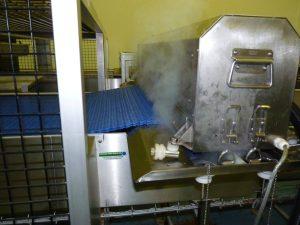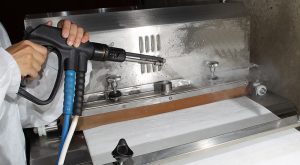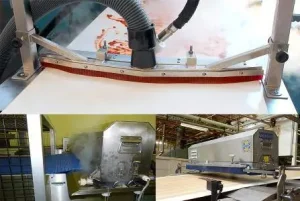In the realm of industrial operations, the significance of conveyor cleaning cannot be overstated. Conveyors are the lifeblood of many manufacturing and distribution processes, facilitating the smooth movement of goods from one point to another. However, as they transport materials, they inevitably accumulate dust, debris, and residues that can hinder their efficiency.
Regular cleaning is essential not only for maintaining optimal performance but also for ensuring the longevity of the equipment. When you neglect to clean your conveyor systems, you risk operational downtime, increased maintenance costs, and potential safety hazards. Moreover, a clean conveyor system contributes to the overall hygiene of your production environment.
In industries such as food processing and pharmaceuticals, where cleanliness is paramount, failing to maintain clean conveyors can lead to contamination risks. This could result in product recalls, regulatory fines, or even damage to your brand’s reputation. Therefore, prioritising conveyor cleaning is not merely a matter of aesthetics; it is a critical component of operational excellence and compliance with industry standards.
Summary
- Proper conveyor cleaning is essential for maintaining hygiene, preventing contamination, and ensuring smooth operation in various industries.
- Types of conveyor brushes include spiral, strip, rotary, and cylinder brushes, each designed for specific cleaning requirements.
- Quality conveyor brushes offer benefits such as improved sanitation, reduced downtime, increased productivity, and extended conveyor belt life.
- Factors to consider when choosing conveyor brushes include brush material, bristle density, brush length, and compatibility with the conveyor system.
- Proper maintenance of conveyor brushes involves regular inspection, cleaning, and replacement of worn-out brushes to ensure optimal performance and longevity.
Types of Conveyor Brushes
When it comes to conveyor cleaning, the type of brushes you choose plays a pivotal role in achieving effective results. There are several types of conveyor brushes available, each designed for specific applications and materials. For instance, nylon brushes are popular due to their durability and resistance to wear.
They are particularly effective for general cleaning tasks and can handle a variety of surfaces without causing damage. If you are dealing with more delicate materials or sensitive products, you might consider using softer bristle brushes that provide a gentler touch while still ensuring thorough cleaning. Another option is the use of spiral brushes, which are designed to wrap around the conveyor belt or rollers.
These brushes are excellent for reaching into crevices and corners that standard brushes might miss. They can be particularly useful in environments where debris tends to accumulate in hard-to-reach areas. Additionally, there are specialised brushes designed for specific industries, such as food-grade brushes that meet stringent hygiene standards.
Understanding the different types of conveyor brushes available will enable you to select the most suitable option for your specific cleaning needs.
Benefits of Quality Conveyor Brushes

Investing in quality conveyor brushes offers numerous advantages that can significantly enhance your cleaning processes. Firstly, high-quality brushes are designed to withstand the rigours of industrial use, ensuring they maintain their effectiveness over time. This durability translates into cost savings, as you will not need to replace them as frequently as lower-quality alternatives.
Furthermore, quality brushes often feature advanced bristle technology that allows for more efficient cleaning, reducing the time and effort required to maintain your conveyor systems. In addition to their durability and efficiency, quality conveyor brushes contribute to improved safety in the workplace. A clean conveyor system reduces the risk of slips and falls caused by debris accumulation.
Moreover, by ensuring that your equipment operates at peak performance, you minimise the chances of mechanical failures that could lead to accidents or injuries. Ultimately, investing in quality conveyor brushes is an investment in both productivity and safety within your operations.
Factors to Consider When Choosing Conveyor Brushes
| Factors to Consider | Description |
|---|---|
| Brush Material | Consider the type of material being conveyed and choose a brush material that is compatible and effective. |
| Brush Size and Shape | Ensure that the brush size and shape are suitable for the conveyor system and the specific application. |
| Brush Density | Choose the appropriate brush density to achieve the desired cleaning or conveying results. |
| Operating Environment | Take into account the operating environment, including temperature, humidity, and exposure to chemicals or abrasive materials. |
| Mounting Options | Consider the available mounting options for the conveyor brushes, such as strip brushes, shaft-mounted brushes, or custom mounting solutions. |
| Maintenance Requirements | Evaluate the maintenance needs of the conveyor brushes and choose a design that is easy to maintain and clean. |
Selecting the right conveyor brushes involves careful consideration of several factors to ensure optimal performance and longevity. One of the primary considerations is the material of the brush bristles. Depending on the type of debris you are dealing with and the surface of your conveyor system, you may need stiffer or softer bristles.
For instance, if you are cleaning heavy-duty machinery or handling abrasive materials, stiffer bristles may be necessary to effectively remove stubborn residues. Another important factor is the size and shape of the brush. The dimensions should correspond with the specific areas you need to clean; larger brushes may cover more surface area but could be less effective in tight spaces.
Additionally, consider whether you require a custom brush solution tailored to your unique operational needs. Customisation can enhance cleaning efficiency by ensuring that every nook and cranny is addressed during the cleaning process.
Proper Maintenance of Conveyor Brushes
To maximise the lifespan and effectiveness of your conveyor brushes, proper maintenance is essential. Regular inspection should be part of your routine; check for signs of wear and tear, such as frayed bristles or bent wires. Addressing these issues promptly can prevent further damage and ensure that your brushes continue to perform optimally.
Cleaning the brushes themselves is also crucial; debris can accumulate on the bristles over time, reducing their effectiveness. A simple wash with warm soapy water can often do wonders in restoring their functionality. Additionally, consider implementing a replacement schedule based on usage patterns.
If your operations involve heavy use of conveyors, you may need to replace brushes more frequently than in less demanding environments. Keeping a log of brush performance and replacement dates can help you stay organised and proactive in your maintenance efforts.
Common Conveyor Cleaning Challenges

Despite your best efforts, conveyor cleaning can present various challenges that may hinder your operations. One common issue is the accumulation of sticky residues that are difficult to remove with standard cleaning methods. In such cases, you may need to employ specialised cleaning agents or tools designed specifically for tackling stubborn substances.
Additionally, if your conveyors operate in environments with high levels of dust or debris, maintaining cleanliness can become an ongoing battle. Another challenge is ensuring that all areas of the conveyor system are accessible for cleaning. Some designs may have hard-to-reach spots that require additional effort or specialised equipment to clean effectively.
This can lead to inconsistent cleaning results if not addressed properly. Identifying these challenges early on will allow you to develop strategies and solutions tailored to your specific operational needs.
Tips for Efficient Conveyor Cleaning
To streamline your conveyor cleaning processes and enhance efficiency, consider implementing a few best practices. Firstly, establish a regular cleaning schedule that aligns with your production cycles. This proactive approach will help prevent excessive build-up and make each cleaning session more manageable.
Additionally, training your staff on proper cleaning techniques and the importance of maintaining clean conveyors can foster a culture of cleanliness within your organisation. Utilising the right tools is also crucial for efficient cleaning. Invest in high-quality conveyor brushes and consider incorporating automated cleaning systems where feasible.
These systems can significantly reduce manual labour while ensuring thorough cleaning results. Finally, always keep an eye on emerging technologies and innovations in conveyor cleaning solutions; staying informed will enable you to adopt new methods that could further enhance your efficiency.
Choosing the Right Supplier for Quality Conveyor Brushes
Selecting a reliable supplier for your conveyor brushes is a critical decision that can impact your operations significantly. Start by researching potential suppliers thoroughly; look for those with a proven track record in providing high-quality products tailored to your industry needs. Reading customer reviews and testimonials can offer valuable insights into their reliability and product performance.
Additionally, consider suppliers who offer excellent customer service and support. A responsive supplier can assist you in selecting the right products for your specific requirements and provide guidance on maintenance practices. Furthermore, inquire about their warranty policies; a reputable supplier should stand behind their products and offer assurances regarding quality and durability.
By taking these factors into account, you can ensure that you choose a supplier who will meet your needs effectively and contribute positively to your conveyor cleaning efforts.
FAQs
What is a conveyor cleaning brush?
A conveyor cleaning brush is a device used to clean conveyor belts and remove debris, dirt, and other contaminants from the surface of the belt. It is typically made of bristles or other materials that are designed to effectively clean the belt without causing damage.
How does a conveyor cleaning brush work?
A conveyor cleaning brush works by being mounted on the conveyor system and coming into contact with the surface of the belt as it moves. The bristles of the brush effectively remove debris and contaminants from the belt, helping to maintain a clean and efficient conveyor system.
What are the benefits of using a conveyor cleaning brush?
Using a conveyor cleaning brush can help to improve the efficiency and performance of a conveyor system by keeping the belt clean and free from debris. This can reduce the risk of damage to the belt and other components, as well as prevent contamination of products being transported on the conveyor.
What types of conveyor cleaning brushes are available?
There are various types of conveyor cleaning brushes available, including spiral brushes, strip brushes, and rotary brushes. These brushes can be made from different materials such as nylon, polypropylene, or steel, and can be customised to suit specific conveyor belt types and cleaning requirements.
How do you maintain a conveyor cleaning brush?
To maintain a conveyor cleaning brush, it is important to regularly inspect the brush for wear and damage, and replace it when necessary. It is also important to keep the brush clean and free from debris to ensure it continues to effectively clean the conveyor belt.










